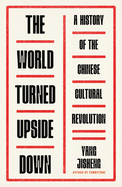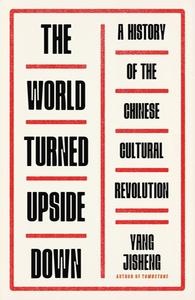
 The World Turned Upside Down is a detailed, deeply researched history of the Great Proletarian Cultural Revolution, precisely tracking the complex currents and countercurrents that devastated the lives of hundreds of thousands of Chinese citizens from 1966 to 1976. The Cultural Revolution is still a highly sensitive topic in China: journalist Yang Jisheng's lengthy book, translated and pared down from its original immensity, was published in Hong Kong and "cannot be legally sold or circulated in mainland China." Indeed, the book presents a highly unflattering picture of Mao Zedong and the ruling "bureaucratic clique" that, from the author's perspective, "won" the Cultural Revolution at a terrible cost to both ordinary citizens and bureaucrats.
The World Turned Upside Down is a detailed, deeply researched history of the Great Proletarian Cultural Revolution, precisely tracking the complex currents and countercurrents that devastated the lives of hundreds of thousands of Chinese citizens from 1966 to 1976. The Cultural Revolution is still a highly sensitive topic in China: journalist Yang Jisheng's lengthy book, translated and pared down from its original immensity, was published in Hong Kong and "cannot be legally sold or circulated in mainland China." Indeed, the book presents a highly unflattering picture of Mao Zedong and the ruling "bureaucratic clique" that, from the author's perspective, "won" the Cultural Revolution at a terrible cost to both ordinary citizens and bureaucrats.
While official histories often pin the blame for the chaos and destruction of the Cultural Revolution on the rebel factions that proliferated during the period, Yang takes a much more top-down view. The World Turned Upside Down shows that the Cultural Revolution began as Mao's attempt to attack his enemies in the bureaucracy and "clear away obstacles for his envisaged paradise." However, the bureaucratic clique fought back, and Mao's calls for continuous revolution were followed by waves of repression in a constant back-and-forth that paralyzed the economy and resulted in terrible violence. Yang argues that the bureaucratic clique came out on top, after Mao's death effectively ended the Cultural Revolution in 1976, setting the stage for the economic expansion and widespread corruption of modern China.
The World Turned Upside Down is packed with detail, carefully tracking the moves and countermoves of bureaucrats and rebels, the frequent reversals of fortune that suddenly turned heroes into enemies and vice versa, the constant maneuvering in the corridors of power and Mao's fickle decision-making. In that sense, the book feels both authoritative and not for the faint of heart. Yang does not go out of his way to arrange the turmoil of the Cultural Revolution into an easy-to-digest narrative. Instead, he presents the facts and mostly lets them speak for themselves, only occasionally dropping in a personal anecdote (Yang was a student in Beijing and participated when the revolution began). Which isn't to say The World Turned Upside Down lacks perspective: Yang's careful accumulation of facts becomes a moral accounting, providing a model for how rigorous scholarship can penetrate ideology and arrive at something like the truth. The World Turned Upside Down may be the definitive account of a tragic historic episode. --Hank Stephenson, manuscript reader, the Sun magazine
Shelf Talker: The World Turned Upside Down is a rigorous, lengthy history of the Great Proletarian Cultural Revolution that may prove to be the definitive account of the upheaval.

